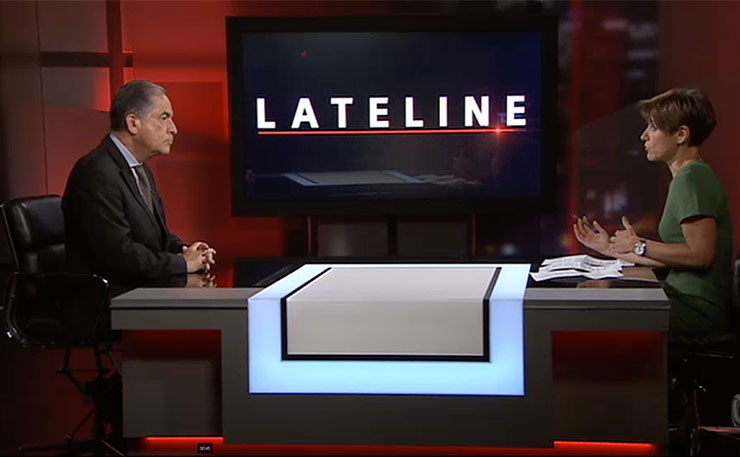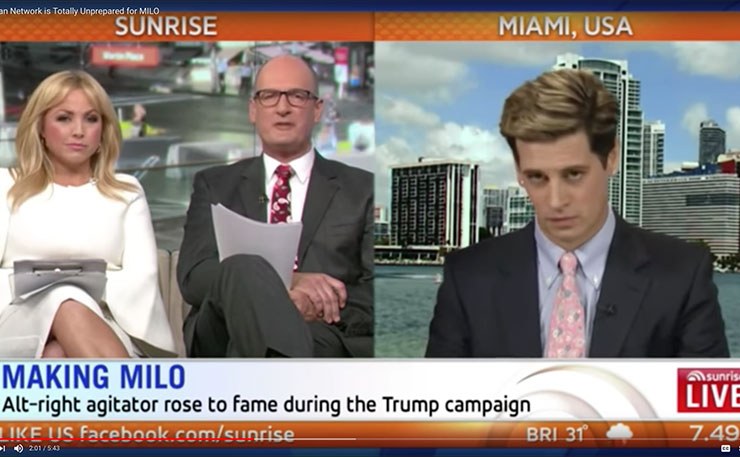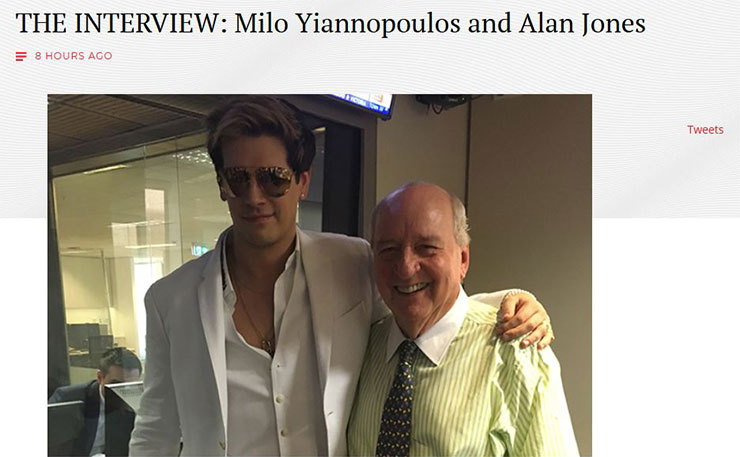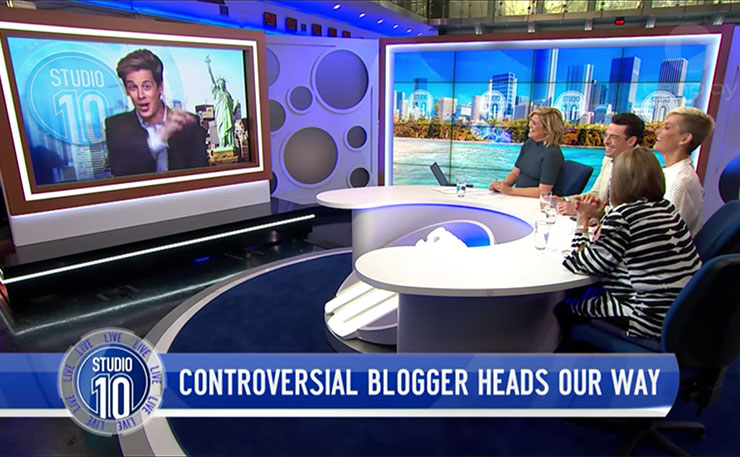The current tour of neo-nazi supporter Milo Yiannopoulous will give a lot of Australians pause for thought about our national values. Just not Australians who happen to work in commercial media, writes Michael Brull.
Milo Yiannopoulos has landed in Australia. An array of media platforms have been offered to him, such as Alan Jones’s radio show, a friendly appearance without any critics on Channel 7, continued friendly coverage in the Daily Mail, an interview on the Kyle and Jackie O show, and op ed space in the Australian.
There is no leftist in Australia who gets offered comparable platforms. When leftists do visit Australia, they are mostly ignored.
Right now, progressive Israeli journalist Gideon Levy is on a speaking tour of Australia. Unless you showed up to his events, you probably missed his few radio appearances, or the intensely hostile questions from this clueless ABC interviewer on Lateline.
Certainly, no-one invited him on commercial television. On the rare occasions leftists are allowed on television, they are balanced by people who will drown them out with conventional wisdom.

The reason is pretty straightforward. Leftist ideas threaten people with power and money. Jeremy Corbyn just released an ad announcing he was a threat to Morgan Stanley, one of the biggest and most powerful investment banks in the world. People who challenge entrenched power and major institutions – like Corbyn – are constantly reviled by the corporate media.
Being politically incorrect? Who does that scare? It is true that that sexism, racism, homophobia, transphobia and so on are generally regarded as bad things in a way that they weren’t always (though as the list progresses, they gather less public sympathy). However, these things don’t just refer to private opinions. They also refer to institutionalised discrimination and oppression.
Aboriginal people live over a decade less than other Australians, are massively over-represented in the criminal justice system, and suffer from various other forms of socio-economic disadvantage. One way to redress this inequality would be to return land to Aboriginal people. However, much of that land is occupied by mining companies, and large-scale farming interests. And so, mining companies fund think tanks like the Centre for Independent Studies, which solemnly explain why Aboriginal land rights is a terrible idea.
That is, there are concrete interests that are served by upholding the current distribution of wealth and power. There are organisations and pundits which justify the status quo and find ingenious ways to argue that the current hierarchies in society are rightful and inescapable. They make a lot of money from it, because it is lucrative to defend the interests of the richest people and organisations in Australia.
In the 1980s, mining magnate Hugh Morgan felt threatened by the threat of national land rights legislation. He whipped up a public campaign demonising Aboriginal people. The greatest success of the campaign against Aboriginal land rights was its insistence that the threat wasn’t just to super rich mining companies. No, the threat was to your backyard too. This was a shrewd campaign, and is basically a neat illustration of how the super-rich use racism to protect their own interests, and broader inequalities in society.
The mining industry had to pay good money to take out ads. But there will always be people who notice that there is a lucrative market for the right message.
For people who live in certain types of progressive circles, it is hard to imagine selling oneself to whoever bids highest enough for the right type of bigotry. But most people aren’t affected by some forms of hierarchy, most people aren’t convinced of the legitimacy of some form of equality, and there will always be rewards for those willing to argue in defence of the rich and powerful.
Take for example, the current case of Harvey Weinstein. There is a widespread sense of a new political correctness emerging, as sexual harassment is taken more seriously, and cultural norms shift not only against those who have engaged in sexual harassment, but also those who defend it.
Some have tried to use the issue to target extremely wealthy and powerful people. For example, Rose McGowan called out Jeff Bezos, one of the two richest people in the world. Media attention has focused on sexual harassment for a while, and it has threatened major corporate interests and powerful individuals. But inevitably, there will be people who will argue that sexual harassment isn’t such a big deal, women need to lighten up, the burden should be placed on complainants rather than employers, and so on.
Those arguments will happen to align with corporate interests that are worried about the costs of possible public exposure, public relations debacles, and the need for reform.
Whilst not all sexual harassment can be reduced to the issue of economic inequality, it is often the key ingredient of power that enables a predator like Harvey Weinstein. Trump himself said, “when you’re a star, they let you do it. You can do anything.”

The situation of being harassed by a stranger is not the same as being harassed by your boss, who holds your career in their hands. Just two years ago, a veteran surgeon advised female surgeons to surrender to supervisors who sexually harass them, as “the worst thing you could possibly do is to complain to the supervising body”, which would destroy a woman’s career.
She was the co-author of a book on gender equality, who was utterly resigned to the desperate situation of women who are sexually harassed in medicine.
There is a connection between sexual harassment, and broader economic inequality. As Brit Marling wrote, “consent is a function of power. You have to have a modicum of power to give it. In many cases women do not have that power because their livelihood is in jeopardy”.
If women get paid less for the same work, are less likely to be represented higher up the work chain, then that power imbalance is fundamental to the issues of consent and harassment that arise. Marling observed that as “a gender whole, women are poor. This means that, in part, stopping sexual harassment and abuse will involve fighting for wage parity.” It will mean redistributing wealth and power, reforming workplaces to make them more democratic, and so on.
Again, these kinds of reforms threaten those at the top of the economic food chain, and represent costly reforms to large business interests.
In the space of this article, I cannot sketch out entirely how sexism and racism operate, and have to elide complications and nuances. Broadly speaking though, the story sketched out above is straightforward. Sexism, racism and so on are the kinds of ideas that justify already existing hierarchies in society. Whilst it may sometimes feel like there are pressures to adhere to anti-sexist (or whatever) values, there will always be rewards for those who uphold and serve existing hierarchies, because those hierarchies are fundamentally skewed towards those with wealth and power.
This is what is so gross about the various reactionary creeps who make a living by flattering rich benefactors. They somehow present themselves as brave heretics challenging the stifling grip of political correctness, whilst being showered with accolades and wealth for their supposedly brave stances.
This applies even to some of the most extreme and unpopular manifestations of racists. Take Richard Spencer, who coined the term “alt right” as a less pejorative way to describe the neo-Nazi movement, for which he serves as a leading intellectual.
RL Stephens observed that, “Richard Spencer’s most important identity isn’t white. It’s landowner. He and his family own cotton fields in Louisiana and have received over $2 million in farm subsidies from the federal government. He does not care about flags, and frankly he doesn’t truly care about white people either”.
Or take Milo. Milo’s career was built by slavishly following the orders for a cultural war by his deranged boss, Stephen Bannon. Bannon was a vice-president at Goldman Sachs, one of the most powerful investment banking firms in the world.

The Breitbart website had the backing of the billionaire Mercer family. A few weeks after Milo was fired from Breitbart for his strange comments defending the paedophile who molested him, the Mercers began sending money for him to start up his own media company. Funny how “brave” Milo can be when he’s backed by one of the richest people on the planet to demonise Muslims and feminism.
In November, Bob Mercer announced that he would sell his stake in Breitbart to his daughter, and would stop funding Milo Inc. Though it is possible that Mercer’s daughter will back Milo, it is possible that Milo needs a new billionaire benefactor, if Breitbart won’t take him back. Whilst Milo is somehow still moderately palatable in mainstream Australian media, in the US he is utterly toxic.
Just a month ago, the conservative website Daily Caller ran an unpaid column by Milo. The people who run the site were apparently so appalled by this decision that they fired the opinion editor who was stupid enough to publish Milo in the first place.
There is one more point worth making. The types of racism that are acceptable in any given society may vary. Racism against Tutsis, or Serbians, or Lebanese people, may make sense in one society, but seem weird and quaint in another.
Racism “succeeds”, in the sense of spreading and becoming widely accepted, where it serves the interests of the people at the top of the hierarchy in society. Open bigotry against Jews – and the Nazism it is associated with – does not serve those interests in countries like Australia, and is discredited as the ideology of a government that we went to war with.

Thus, the British National Party’s leader Nick Griffin tried to reposition the party as pro-Israel and not anti-Semitic. Likewise, Milo expressed concern about a staffer who “thinks tweets about Jews are just fine”. Of a new hire, Milo wrote “Let me know if there’s anything specific that’s really bad eg. any Jew stuff… His entire Twitter persona will have to change dramatically once he gets the job.”
It’s not that Milo was opposed to anti-Semitism itself. He tried to get his bosses to agree to a neo-Nazi hacker appearing on his podcast. They said no, despite Milo pleading the case (“Great provocative guest… He’s one of the funniest, smartest and most interesting people I know…. Very on brand for me.”) It’s that Milo thought – correctly – that promoting neo-Nazism was one thing, but openly seeming like a neo-Nazi by demonising Jews was something else.
If he didn’t demonise Jews, he wouldn’t be regarded as a Nazi. He would be regarded as… controversial. Or a firebrand. Or opposed to political correctness, and all the other inane euphemisms that have spread through Australian media.
The fact that Milo has promoted Nazi propaganda should make him utterly toxic, like it has in the US. But it hasn’t.
Milo himself is empty bombast. He doesn’t write his own screeds or speeches, and soon he’ll go back to the US where his career has shrivelled up. But the receptiveness and openness to Milo has been a harrowing demonstration of how quickly and easily neo-Nazism can be rehabilitated in public life, so long as the right targets are being demonised.
Milo will soon be gone, but Australia hasn’t even begun to grapple with the kinds of issues his warm reception has demonstrated.
PLEASE CONSIDER SHARING THIS STORY ON SOCIAL MEDIA: New Matilda is a small independent Australian media outlet. You can support our work by subscribing for as little as $6 per month here.
Donate To New Matilda
New Matilda is a small, independent media outlet. We survive through reader contributions, and never losing a lawsuit. If you got something from this article, giving something back helps us to continue speaking truth to power. Every little bit counts.




